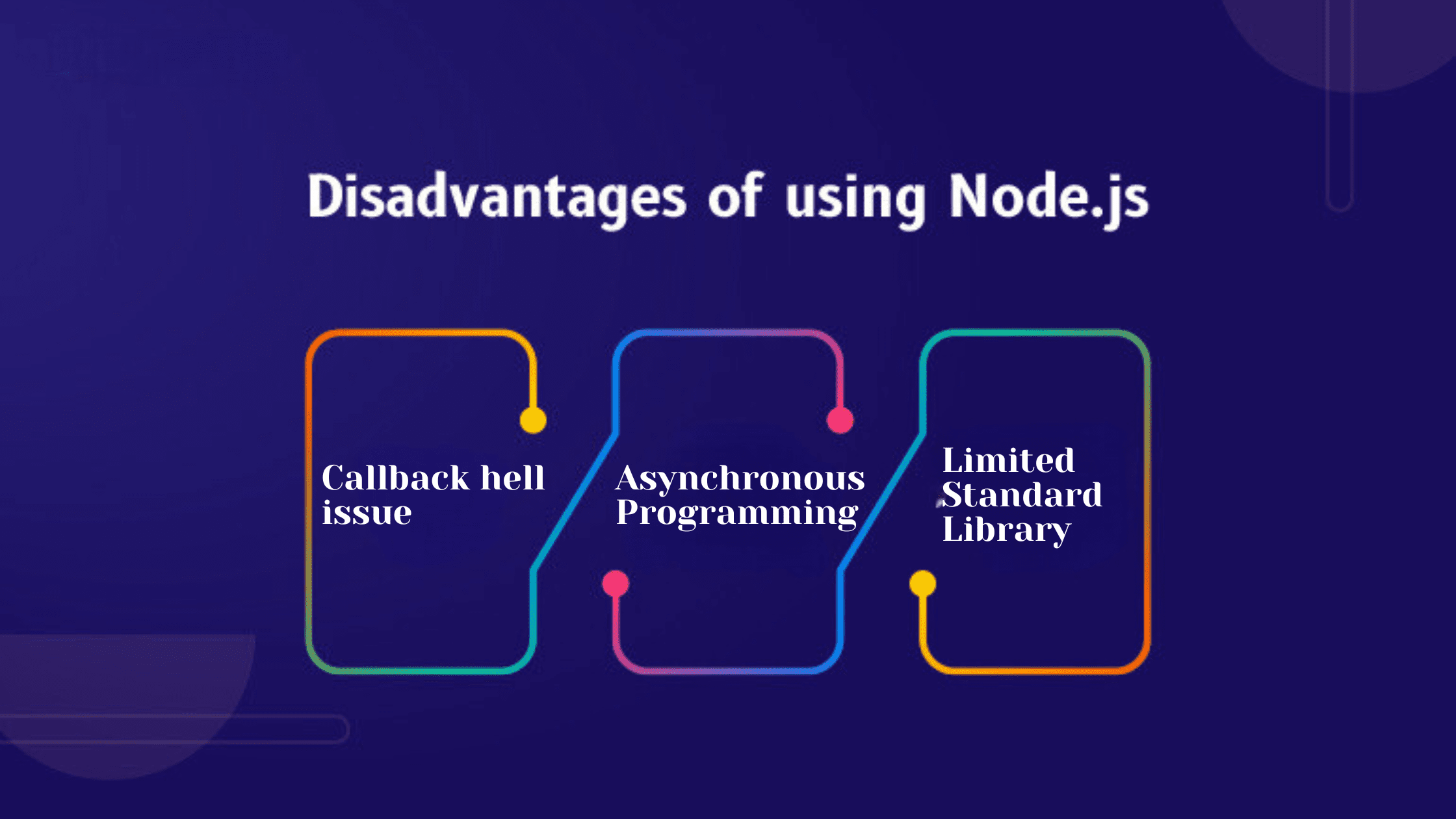Node.js has become a top choice for web development since its launch. It was created in 2009 with an emphasis on performance and scalability, and it has been a popular choice for startups and big businesses alike for their production requirements. Major firms like Microsoft, PayPal, IBM, LinkedIn, and Netflix have adopted Node.js as a runtime for creating real-time apps and high-traffic websites because they have carefully considered the Advantages and Disadvantages of Node.js.
In 2023, the Stack Overflow report shows that developers consider Node.js as their top choice again. This open-source runtime environment uses Chrome’s V8 JavaScript engine to operate on an event-driven and non-blocking I/O model. These features contribute to Node.js being lightweight, highly efficient, and exceptionally fast, making it an ideal choice for application development and web services execution.
However, like any technology, Node.js has its own advantages and disadvantages. In this exploration, we have curated a comprehensive list of Node.js pros and cons that are vital for product or application development businesses. Understanding these strengths and limitations becomes crucial in determining whether to opt for Node.js for your next-generation application or explore alternative solutions.
ADVANTAGES OF NODE.JS

Targets All Major Platforms:
Node.js boasts cross-platform support, enabling applications to smoothly target Windows, Linux, and macOS with a unified code base. To enhance cross-platform real-time web applications, developers recommend frameworks like Electron or NW.js, eliminating the need for separate codes.
This approach empowers your software development team to create native desktop applications effortlessly, bypassing the complexities of languages like Objective-C or C#. The Google Chrome Developer Tool further aids Node.js development teams with efficient tools for rapid building, debugging, and coding.
Offers Long-Term Support for Enterprises:
Node.js is a top choice for businesses valuing stability and lasting support. Its Long-Term Support (LTS) policy ensures a predictable release cycle, which is vital for enterprise planning. The collaboration under the Node.js Foundation, now part of the OpenJS Foundation, guarantees innovation without compromising stability.
The Node Package Manager (NPM) also simplifies development with a vast database of over 836,000 packages, fostering efficient feature integration. NPM offers secure packages, a private registry, and robust security features for enterprises, ensuring vulnerability-free code and streamlined access permissions.
At last, Node.js is an ideal runtime environment for businesses prioritizing lasting support and stability in software development.
Rich Ecosystem: Node.js Libraries and Tools
npm, or the Node Package Manager, is a driving force in advancing Node.js technology. As the default package manager for Node.js and a vibrant marketplace for open-source JavaScript tools, npm hosts over 1 million packages, including 42 thousand exclusively for Node.js. Weekly, it sees an impressive 10,000 new packages, highlighting the dynamic growth of the Node.js ecosystem.
Notably, 97 percent of web applications rely on npm modules, underscoring its widespread adoption among developers. With an extensive array of free tools that are easily accessible, Node.js presents significant opportunities.
Additionally, the surge in open-source software popularity aligns effectively, enabling innovative solutions while minimizing development costs and accelerating time-to-market.
Cost-Effective with Fullstack JS:
Node.js presents a unique advantage by enabling developers to coherently write server-side code in JavaScript, allowing for a unified language across both front-end and back-end development.
It not only breaks down the traditional barriers of needing separate resource teams but also results in significant time, cost, and energy savings for the entire project.
The ability to leverage JavaScript on both server and client sides streamlines development and reduces overall expenses associated with managing different languages for front-end and back-end tasks.
The synergy achieved through using a single language enhances code maintainability and accelerates the development lifecycle, making Node.js a powerful choice for full-stack JavaScript development.
Easy to Learn and Quick to Adapt:
Node.js, built on the widely-used JavaScript language, offers an accessible path for developers with JavaScript skills to delve into server-side development. Its ease of adoption has attracted a growing number of developers, evident in a 2018 survey where half found Node.js knowledge easy to acquire, with 62% expressing increased job satisfaction.
This positive sentiment has led to a global pool of talented Node.js developers, particularly benefiting front-end specialists. However, server-side software demands additional skills like database design, extending beyond typical front-end expertise.
As Node.js popularity rises, more individuals choose it for training or retraining, contributing to a dynamic job market. The demand for skilled Node.js developers often outstrips supply, exacerbated by shifts in the global talent pool, making it crucial to stay agile and seize opportunities in this evolving landscape.
Offers Extensibility to Meet Customized Requirements:
The business market is dynamic. For businesses expanding quickly, Node.js provides smooth expansion and customization, regardless of whether you’re seeing a spike in your user base or thinking about branching out into new industry areas.
Node.js makes data communication between clients and web servers easier by using its built-in API for creating HTTP and DNS servers and the user-friendly JSON data format.
With Node.js, you can easily optimize and adapt your business.
Large Community Support:
Countless developers actively contribute to the Node.js community, fostering global collaboration to address diverse development challenges. NPM, the world’s most extensive package manager registry, provides developers with immediate access to tools and libraries for effective project integration. GitHub complements this by offering many resources, including pre-built solutions and scripts.
IBM strongly supports Node.js, sponsoring key events and participating in the Node.js and JS Foundations merger to strengthen the JavaScript ecosystem. Tech giants like Amazon, Google, Facebook, and Netflix significantly contribute, ensuring Node.js’ continued growth through open-source projects.
As Node.js evolves, it remains a hub for collaborative innovation and technological advancement, backed by a diverse and engaged developer community.
DISADVANTAGES OF NODE.JS

Callback hell issue:
Node.js heavily relies on callbacks due to its asynchronous nature. These functions execute after each task in the queue is completed. However, managing a multitude of queued tasks with their respective callbacks can lead to a phenomenon known as callback hell.
This situation arises when callbacks are nested within other callbacks, creating multiple levels of complexity that can make the code challenging to comprehend and maintain. This is often indicative of suboptimal coding practices and a lack of experience with JavaScript and Node.js.
The provided code can be revamped and simplified with a few steps, as illustrated on callbackhell.com. Promises, which address this specific issue, are considered more advanced than callbacks and are arguably more challenging to implement correctly.
Asynchronous Programming:
While the asynchronous, non-blocking nature of Node.js contributes to its high performance. It can be challenging for developers unfamiliar with asynchronous programming paradigms. Callbacks, Promises, and async/await patterns are essential concepts that developers must grasp to work with Node.js effectively.
The asynchronous nature can lead to complex code structures and potential pitfalls, requiring careful design and consideration.
Limited Standard Library:
Unlike other runtime environment/engine, Node.js has a limited standard library. While npm provides access to a vast array of third-party packages, the absence of a comprehensive standard library may require developers to rely heavily on external modules for specific functionalities.
This reliance on external packages introduces dependencies and increases the risk of compatibility issues and security vulnerabilities.
The Verdict
Node.js is a powerful choice for web development, lauded for its performance, scalability, and broad industry adoption. Like all other runtime environment/engine, it also has a number of strengths and weaknesses. Furthermore, Its advantages encompass cross-platform support, enterprise-grade stability, a rich ecosystem, cost-effectiveness, and ease of learning. However, challenges include an occasionally unstable API, complexities in asynchronous programming, and a limited standard library.
Looking to leverage Node.js for your web application development needs? Our Canadian Software agency specializes in delivering cutting-edge web development services tailored to your unique requirements. Contact us to explore how Node.js can elevate your online presence and user experience.






